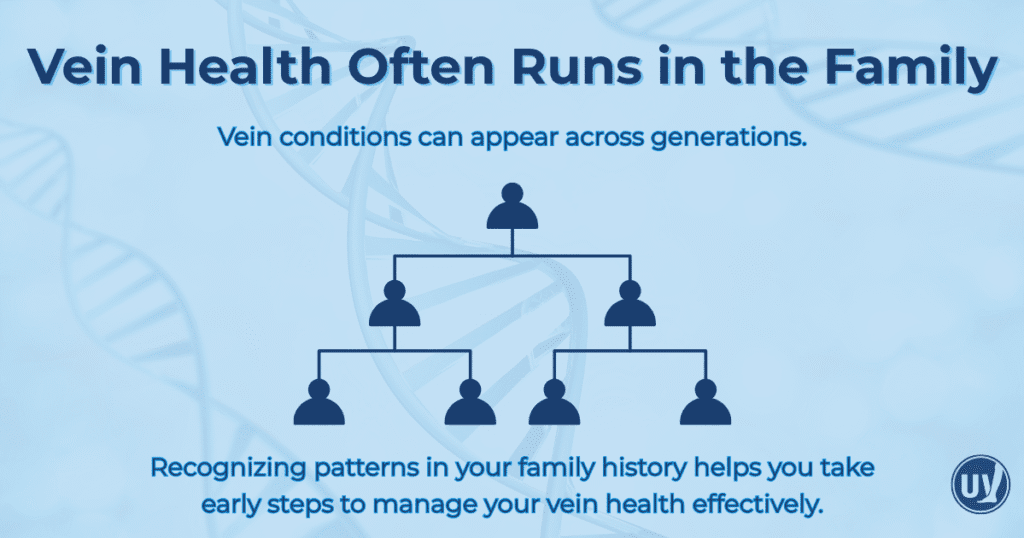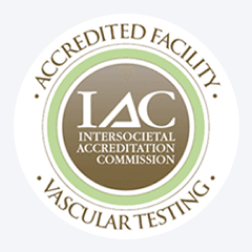Contents
- Understanding Inherited Vein Conditions
- The Science Behind Hereditary Vein Disorders
- Common Genetic Vein Disorders and Their Symptoms
- How Family History Influences Vein Health
- Risk Factors: Genetics vs. Lifestyle
- Diagnosing Inherited Vein Conditions
- Treatment Options for Genetic Vein Disorders
- Prevention and Proactive Vein Health
- When to Seek Help: Guidance for Patients and Families
- Our Commitment to Patient-Centered Vein Care
- Frequently Asked Questions
Vein issues are not always just a personal concern. For many people, they appear across multiple generations, hinting at a deeper genetic connection. Understanding how and why vein conditions are inherited can help you stay one step ahead in protecting your vein health.
Certain vein problems, like varicose veins or deep vein thrombosis, can be influenced by genes passed down through families. While genetics play a major role, lifestyle and environmental factors can also affect how these conditions develop.
Knowing your family history gives you the insight needed to take proactive steps, catch potential issues early, and explore effective treatment options.
Understanding Inherited Vein Conditions
Inherited vein conditions are influenced by genetics, meaning they’re passed down from parents to children. This can occur when specific genes responsible for vein health are altered or defective. These gene changes can impact the structure and function of veins, leading to conditions like varicose veins or chronic venous insufficiency.
Recognizing the influence of family history is important for early intervention. Those with a family background of vein issues should be attentive to their vein health.
It’s not just one gene but often a combination of multiple genetic factors that contribute. Lifestyle elements, such as diet and activity level, can influence the severity and onset of symptoms.
Common inherited vein conditions include:
- Varicose veins
- Chronic venous insufficiency
- Deep vein thrombosis
By understanding the genetic basis, patients can work with healthcare providers to develop personalized care strategies. Proactive management and lifestyle modifications play a crucial role in maintaining optimal vein health.
The Science Behind Hereditary Vein Disorders
Hereditary vein disorders are complex and involve a blend of genetic predispositions and biological processes. Veins are vital for returning blood to the heart, and any disruptions can lead to vascular conditions.
Genetic changes, or mutations, can weaken vein walls or cause faulty valve functions. These defects make it difficult for veins to perform efficiently, often resulting in blood pooling and increased pressure.
Research has identified several genes linked to vein disorders, helping scientists understand how genetic factors contribute. By studying these genes, researchers gain insights into why some families are more prone to certain conditions.
Current investigations are also examining the role of inflammation and blood flow dynamics in hereditary disorders. These factors can exacerbate vein problems, complicating how they manifest in individuals.
Key scientific insights into hereditary vascular disorders include:
- Mutations affecting vein structure
- Faulty valve mechanisms leading to blood pooling
- The role of inflammation in vein health
- Genetic predispositions amplifying risk
- The impact of multiple genetic factors together
Common Genetic Vein Disorders and Their Symptoms
Genetic vein disorders manifest in various forms, affecting individuals differently. Some common conditions include varicose veins, chronic venous insufficiency, and deep vein thrombosis.
Varicose veins are enlarged veins, often visible under the skin surface. They may cause aching, heaviness, or swelling in the legs. Chronic venous insufficiency develops when vein walls and valves do not function properly, leading to blood pooling. Symptoms often include leg pain, swelling, and skin changes.
Deep vein thrombosis involves blood clots forming in deep veins, usually in the legs. This condition can be painful, with swelling, warmth, and redness in the affected area. Prompt diagnosis and treatment are crucial to prevent severe complications.
Recognizing symptoms early can help individuals seek timely medical intervention and explore appropriate treatment options. Understanding the unique characteristics and symptoms of each disorder is essential for effective management and care.

How Family History Influences Vein Health
Family history plays a pivotal role in vein health. If your parents or grandparents had vein issues, you might be at increased risk. Understanding this connection can guide preventive measures.
Genetic predisposition means inheriting traits that affect vein structure and function. These inherited traits may lead to weaker vein walls or faulty valves, resulting in conditions like varicose veins and thrombosis.
It’s crucial to recognize the potential for hereditary vascular disorders if vein problems run in your family. Awareness of family history encourages proactive monitoring and lifestyle changes.
Key factors from family history that may influence vein health include:
- Presence of varicose veins
- History of deep vein thrombosis
- Reports of chronic venous insufficiency
- Early onset of vein disorders
Consulting with healthcare professionals can help assess your risks based on family history and establish a tailored care plan.
Risk Factors: Genetics vs. Lifestyle
Both genetics and lifestyle contribute to vein health. Genetic factors set the stage, while lifestyle influences symptom severity and disease progression. This duality requires a balanced approach.
Genetics determine your predisposition to vein conditions. These inherited traits can include vein wall structure and valve integrity. This predisposition cannot be changed, but awareness is key.
Conversely, lifestyle factors are within your control. Choices such as diet, activity level, and smoking habits significantly impact vein health. These habits can either mitigate or exacerbate genetic risks.
Key lifestyle risk factors include:
- Prolonged sitting or standing
- Obesity or inactivity
- Poor diet high in salt or processed foods
- Smoking or excessive alcohol consumption
Understanding the interplay between genetics and lifestyle aids in managing and preventing vein conditions. Tailoring lifestyle changes to your genetic predispositions can optimize vein health and overall well-being.
Diagnosing Inherited Vein Conditions
Diagnosing inherited vein conditions involves a comprehensive evaluation. Understanding your family history is crucial as it provides context for potential genetic risks.
Doctors use various diagnostic tools to assess vein health. These tools include physical exams, Doppler ultrasound imaging, and blood flow studies. Each method reveals different aspects of vein function and structure.
Early diagnosis is vital for managing hereditary vein conditions. It allows for timely interventions that can prevent complications.
Consulting with a specialist ensures an accurate diagnosis. This expertise guides the creation of a personalized treatment plan. Empowering you with knowledge about your specific condition is essential for effective management.
Treatment Options for Genetic Vein Disorders
Treating genetic vein disorders requires a personalized approach. The treatment plan is tailored to the individual’s condition and severity. Understanding the options helps in making informed choices.
Lifestyle changes often play a significant role. These changes include regular physical activity and weight management. Such modifications can alleviate symptoms and prevent progression.
Medical interventions might be necessary for some patients. Doctors may recommend treatments like:
- Compression therapy to enhance blood flow
- Sclerotherapy to seal affected veins
- Endovenous laser treatment for targeted vein closure
- Surgical procedures for severe cases
Discussing these options with a healthcare provider is crucial. A thorough evaluation helps decide the best course of action. Each treatment comes with unique benefits and potential risks. Engaging actively in your care plan promotes better outcomes and improved vein health.
Prevention and Proactive Vein Health
Preventing inherited vein conditions involves a proactive approach. While genetic factors are unchangeable, lifestyle choices greatly influence vein health. Taking steps early can slow or prevent disease progression.
Implementing healthy habits is key. Daily activities that support good circulation include:
- Regular exercise
- Maintaining a healthy weight
- Elevating legs during rest
- Wearing compression stockings when needed
Staying informed about your vein health is equally important. Regular check-ups with your healthcare provider can lead to early detection of potential issues. Educating yourself about these conditions empowers you to take control of your health.
Commitment to these preventive measures can enhance your quality of life. By actively managing risk factors, you contribute significantly to maintaining healthy veins.
When to Seek Help: Guidance for Patients and Families
Recognizing when to seek medical advice for vein concerns is crucial. Patients should be attentive to their symptoms and family history. Early intervention can prevent complications and improve outcomes.
Key signs to look for include:
- Persistent leg pain or heaviness
- Noticeable or worsening varicose veins
- Swelling or skin changes in the legs
Consulting a healthcare professional is recommended when these symptoms are present. Genetic counseling might also be beneficial, especially if there’s a strong family history. Engaging with medical experts ensures a comprehensive assessment of vein health and personalized care. Remember, early action is key to managing inherited vein conditions effectively.
Our Commitment to Patient-Centered Vein Care
At UVVC, we prioritize delivering compassionate, patient-centered care. We understand the challenges faced by those with inherited vein conditions. Our commitment lies in tailoring treatment plans to meet each patient’s unique needs.
We foster a supportive environment where patients feel empowered and educated. Our team of dedicated professionals employs the latest research and techniques. This approach ensures the best possible outcomes, enhancing our patients’ quality of life. Your health and well-being remain our top priorities. Schedule a consultation today!
Frequently Asked Questions
Treatment is personalized and can include lifestyle changes, compression therapy, sclerotherapy, endovenous laser treatment, or surgical interventions for severe cases. Early detection and a tailored care plan help optimize outcomes.
Regular check-ups with a vein specialist, paying attention to early symptoms like leg heaviness, swelling, or varicose veins, and understanding your family history are key. Proactive monitoring allows timely intervention and effective management.
Seek help if you notice persistent leg pain, noticeable varicose veins, swelling, or skin changes. Consulting a specialist early improves treatment success and prevents complications.


